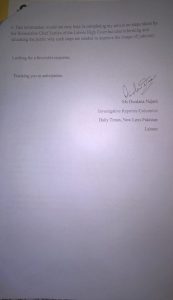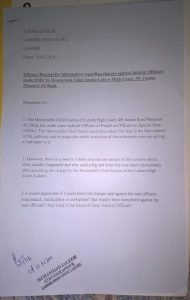Lahore: The legal fraternity of Punjab has a split opinion about the initiative of Chief Justice of Lahore High Court to make 40 judges of lower judiciary Officers on Special Duty (OSD). One group of senior judges of the Lahore High Court, lower judiciary and members of bar councils say that the decision is controversial while the other groups terms it a bold step.
The Chief Justice LHC Mansoor Ali Shah had made 21 judges OSDs on the charges of corruption on June 29. Subsequently, 11 more judges were sidelined in September 2016. According to the CJ, the judges were earning a bad name to the judiciary. The CJ pledged to purge the judiciary of corrupt people and termed his decision as part of self-accountability process undertaken by the LHC. The opposing group takes the decision as a punishment to the judges without evidence while the supporting group believes that it is discretion of the CJ to make any judge an OSD which is not a punishment.
Mohammad Azhar Siddique, a senior lawyer and judicial activist, told News Lens Pakistan that making someone OSD was not a punishment. “Had these Judges been dismissed that would have created legal issues. The Chief Justice did not have the legal authority to remove any judge without conducting an inquiry.” He said that no judge could be made OSD for an unlimited time. Ultimately, Siddique elaborated, after an internal investigation, these judges would be either reinstated or removed depending on the report. “The Chief Justice was not liable to provide evidence at this stage,” said Siddique.
Another lawyer, Salman Akram Raja says if there are corruption charges against any judge, there is no harm in stopping him from doing his work. However, he says, an inquiry should be held in time and the aggrieved judges are given chance of fair trial. “I am sure justice would be done ultimately,” said Raja.
Secretary General of Punjab Bar Council Noman Chohan told News Lens Pakistan, “The CJ was misguided about the judges. Since, the honorable CJ has never served in the lower judiciary, he is unaware of the leg-pulling, illegal practices and other conspiracies in the lower courts.”
According to a senior judge, who wished to go unnamed because he is not authorized to speak to media, these judges were removed on the recommendation of the Evaluation Committee (EC) of the LHC. “The EC comprises five retired and five serving judges.”
He said that the transferred lower courts’ judges had never worked under any of the judges in the EC which produced a report about the officers. “Whatever complaint surfaced against the officers was recorded in the report without mentioning any evidence,” said the judge.
He said, “The rules say that when a complaint is launched against a judicial officer, an inquiry officer who is also a sessions’ judge initiates an investigation. He listens to the complainant and records evidence. In case the legal officer is found guilty he could be removed, given warning, or sent on compulsory retirement. And if no allegation is proved against the member, he is exonerated of all the charges.”
In the case of the OSDs, most of the officers do not even have a single negative confidential report against them nor had any bar association in the country initiated any resolution or charges of corruption against them.
“When an officer is held on the charges of corruption, he is also informed about the charges. He is also provided the evidence. In this case, the judges were only told that they had committed corruption. Therefore, they could not remain active participants in the judicial process,” said the judge.
On the other hand, he said, there are judges against whom several complaints of corrupt practices are pending, but no action had been taken against them.
Another from the lower judiciary, in an exclusive interview, told News Lens Pakistan that the Supreme Court of Pakistan upholds almost 96 percent of the judgments given by the lower judiciary.
“Before leveling charges of corruption against any judge, it is imperative that his decisions are examined. If the judgments he had given were considered right, the accusations of corruption automatically end.”
“A strange rule has been made recently by the LHC that no judge having a complaint against his conducts would be promoted to higher rank,” said the judge. “ Is it possible that a person who is hardworking and honest would have no complaint registered against him in his entire career?”
Talking about the judges made OSD, he said they are the officers who had refused to oblige the judges of the High Court.
He lamented that out of 1700 Judges in Punjab 1590 are doing nothing. Which means no work, no complaint and they just take salaries and perks.
When News Lens Pakistan contacted LHC Registrar, Syed Khurshid Anwar Rizvi he refused to give any information.


The application moved by News Lens Pakistan to find out if any evidence has been prepared against the officers made OSD, the registrar instead of giving any official statement, alleged that the reporter was working on the agenda of the judges made OSD.
When News Lens Pakistan put this question to the policy analyst Saeed Shafqat, Dean Centre of Public Policy Forman Christian College Lahore, he pointed out the reasons why such things happen.
“Like any other institution in Pakistan, there is no concept of third party audit even in the judiciary. If any judge is found of corruption he/she should be investigated by a third party and not by his fraternity, which is liable to create doubts,” said Shafqat.
He said that the National Accountability Courts or Ombudsmen could have conducted an investigation of the officers made OSD. “Self-accountability is prone to fall into disarray as we are seeing,” said Shafqat.
He further noted that such decisions, which are being seen as taken in bad intention, compromises the reputation of the judiciary considered the ultimate arbitrator, interpreter, and enforcer of the law.



